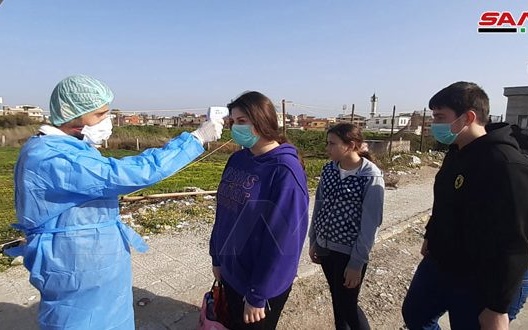In a photo from March 10, 2020, Syrian State news agency SANA shows a medic giving a temperature test at an unspecified location
Syria’s civilians, in both regime and opposition areas, are bracing themselves for the arrival of Coronavirus.
The Assad regime is still not announcing a single case of the illness in the country, fragmented and devastated by a nine-year conflict.
But doctors and aid workers warned that camps for millions of displaced people cannot cope with an overbreak. And resisdents in Damascus countered the regime’s silence by speaking out about their fears.
A World Health Organization official said by e-mail, to an EA correspondent, that 1,200 tests have been given to the central public health lab and that technicians have been trained on detection of the virus.
The official said samples from other parts of Syria can be sent to Damascus for testing; However, he said this cannot be done for northwest Syria, where there are an estimated 3 million people — more than 1 million of them displaced since last April by a Russian-regime offensive seizing part of the territory.
He insisted 1,200 tests were sufficient for the country, considering “regular replenishment” by the WHO.
Omar Hammoud, a children’s doctor in Azaz in the northwest, said there is no plan for the region.
“I’ve taken my precautions in dealing with patients and I’m trying to calm their panic, because there is so much talk about the virus,” he told Reuters at a clinic near the Turkish border.
The WHO said Wednesday that only half of health facilities are operational in the northwest.
Russia and the regime have bombed about 70 hospitals and clinics since last April.
See also Syria Daily, January 3: The Russia-Regime Attacks on Hospitals
Hamoud spoke of the displaced, many of them living with little or no shelter: “If the virus spreads in the camps, controlling it would be very difficult, with the tents so close to each other. There is no safe distance between people here, there is overpopulation.”
Medics have received gloves and masks from the Turkish-based aid agency IDA. They are disinfecting all areas and trying to provide information to camp residents.
However, a doctor in al-Bab in Aleppo Province told Syria Direct, “We don’t have the capacity to analyze [for coronavirus], nor do we have PCR [real-time] testing kits.” He added that, even if there were kits, there are no facilities for analysis of results.
The UK-based Islamic Relief charity said health care in the remaining opposition territory is “at the brink of collapse”.
People’s immune systems have been systematically worn down by the violence and years of malnutrition and poverty. The conditions are rife for an outbreak that we simply do not have the resources to handle.
Worry in Damascus
In the Syrian capital, residents are worried despite the regime’s loud denials of any Coronavirus cases.
“There is no way on earth Syria is immune from a globally spread virus,” one resident told Syria Direct. “The government lives in denial; it’s bullshit.”
The Syrian Cabinet announced on Sunday that it has suspended travel to and from Jordan and Iraq for one month. However, it has not put any restriction on movement to and from Iran, one of the global epicenters of the virus.
On Wednesday, Iran raised its official death toll to 354, among 9,000 cases. Critics, including MPs and officials inside the Islamic Republic, say the actual number is far higher.
Radio Farda claimed on Tuesday, from Iranian sources, that at least 927 people have died.
See also Iran Daily, March 11: Claim — At Least 927 Dead from Coronavirus
On Wednesday, Health Minister Nizar Yazigi repeated that there are no registered cases of the virus as he visited western Syria. He said a quarantine center has been opened in al-Duwair, northeast of Damascus.
Syria Direct’s contact said people are “relatively calm” in Damascus and trying to cope with humor, mocking the regime’s denials.
Meanwhile, activists noted the danger of the virus’s spread in overcrowded and inhumane regime prisons, where thousands of detainees have been executed, tortured to death, or died from the poor conditions during the conflict.
THREAD – @WHOSyria @OCHA_Syria @ICRC_sy have to act now and request urgent access to Syrian regime detention centres. Thousands and thousands of forcibly disappeared people are at risk of #Covid_19 packed into crowded cells, already sick because of horrific conditions
— Bissan Fakih (@Jafra_) March 11, 2020

